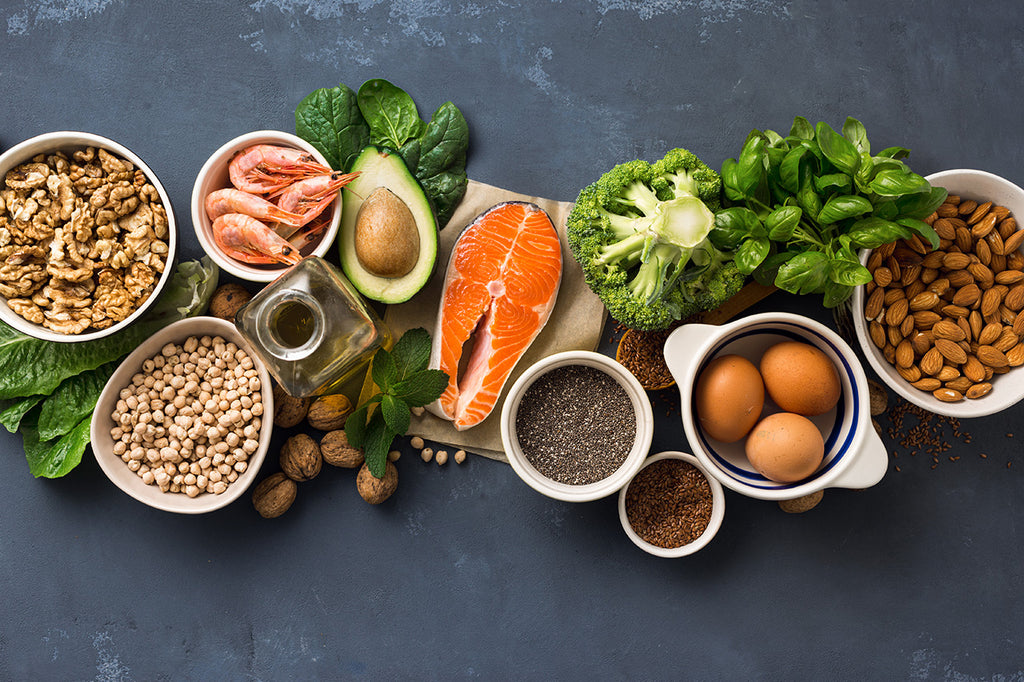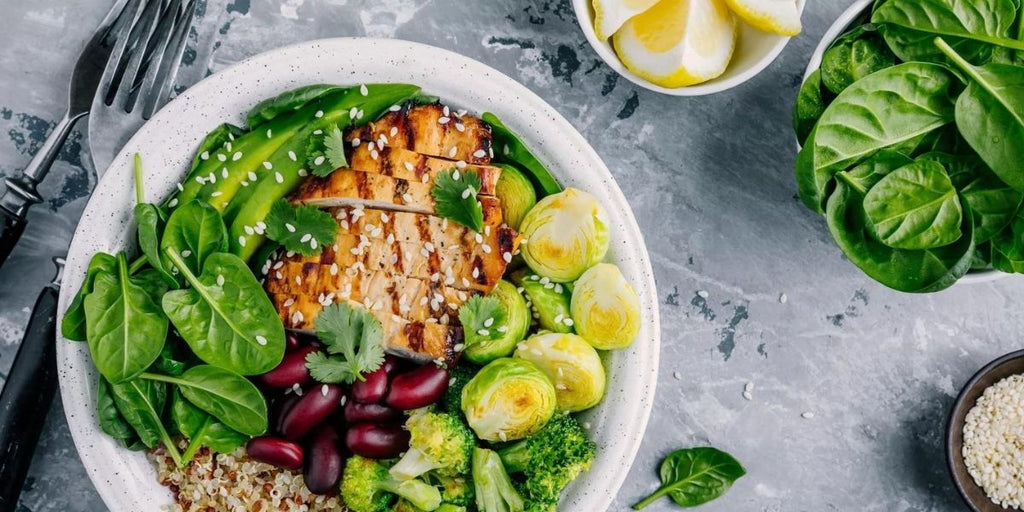
How to set up a healthy diet with ease?
A healthy diet is the basis of a functional body and your well-being.
Even so, healthy eating does not exist. Find out in our article what a healthy diet is and what 10 tips will help you implement it.
What is a healthy diet?
A healthy diet is the basis of a healthy life. It promotes performance and well-being and provides the body with what it needs. Since every person is different and every body has different nutritional needs different , there is no general recommendation for a healthy diet. The following tips will help you make your diet healthier and thus have a major impact on your physical health and performance.
Eat healthy and lose weight
Good nutrition is essential for both weight loss and muscle building. Ultimately, these goals are all about calorie balance. Without a calorie surplus or calorie deficit, you will not be able to gain or lose weight. So let you determine your needs calories in a calorie calculator . We recommend a moderate calorie deficit of 300-500 calories for successful long-term weight loss.
With a balanced diet , you make sure your body gets all the nutrients it needs , even in the event of a caloric deficit.
Before changing your diet, we recommend trying our free body checkup. Set your goals, have your BMI calculated, and receive personalized nutrition and training advice. The perfect basis for your nutrition plan.
To help you maintain a healthy diet, I recommend our Lunch Boxes, thanks to which you can prepare your healthy meals in advance and avoid the temptation of meals on the go, which are often full of additives. On our MaLunchBox website, you will find a wide selection of Lunch Boxes suitable for all tastes and all ages. 
If the image link does not work, click here to access the site.
Bento Lunch Boxes, for example, are very practical to transport.
If the image link does not work, click here to access the site.
Healthy eating: 10 tips
There are rules that facilitate the establishment of a healthy diet. In the following we give you 10 tips for your daily life based on this.
Tip 1: Enjoy the variety of foods
Benefits of plant foods:
- No cholesterol
- High fiber content
- Provide minerals, vitamins and phytochemicals
Disadvantages of animal foods:
- Deliver cholesterol
- High proportion of saturated fatty acids
- Contains purines
For this reason, plant-based foods should be used primarily. For a healthy diet, foods of animal origin should only be included to a lesser extent in the nutritional plan. Fats, oils and foods high in sugar should be eaten sparingly.

Tip 2: Eat as natural and unprocessed as possible
A healthy diet should consist of only a minimal amount of processed foods. Even when shopping, fresh products can preferably end up in the basket.
Healthier alternatives to processed foods:
- Dried fruits instead of confectionery
- Homemade dishes made with fresh ingredients instead of ready-made products
- Freshly squeezed juices instead of sugary supermarket products
Those who prepare their own meals from fresh, unprocessed ingredients have control over what is included. The less pre-cooked or processed they are, the healthier they are generally.
Delicious protein replenishment: 30g protein in 100g peanut butter
Unprocessed alternatives, such as pure organic peanut butter without additives, should therefore be used more often. Peanut butter is especially delicious on protein bread with bananas. The best thing about it? There is a total of 30g of protein in 100g of peanut butter. Curious?
Tip 3: Grain products and potatoes provide many nutrients
Grain products and potatoes are rich in vitamins, complex carbohydrates and minerals. When choosing grain products, use whole grain products , because they contain the most healthy ingredients. Rye and spelled are particularly suitable.
Whole grain products contain a lot of fibers , of which at least 30 g should be consumed per day . Whole grain products should therefore be consumed several times a day, if possible in combination with low-fat ingredients. If you have to eat gluten-free because of an intolerance, you can use cereals such as millet, corn and buckwheat. Common types of grains like wheat, rye, and spelled are high in gluten.
Tip 4: Five servings of fruits and vegetables a day
A healthy diet includes at least 3 servings of vegetables and 2 servings of fruit each day. They contain many important vitamins and phytochemicals . In order to preserve it, it should be eaten fresh as much as possible or only cooked very briefly. Fruits and vegetables can ideally complement your healthy diet as an accompaniment to main meals. They can also be easily integrated into the nutritional plan as a snack between meals. In particular, the B vitamins 2, 6 and 12 play an important role in your physical and mental well-being. In our article you will find out what effect vitamin B12 and why the vitamin is especially important in a vegan diet.
Tip: try to eat a handful of fruits or vegetables at each meal. Eat your muesli with an apple in the morning or prepare raw vegetables to take away. Homemade juices and smoothies also offer delicious variety.
Daily Vitamins - 100% coverage with all essential vitamins
If you can't get your daily dose of fruits and vegetables, we recommend our Daily Vitamins, which provide you with all the vitamins your body needs.
Tip 5: Animal products & dairy products in the right quantities
In principle, animal products should be consumed in smaller quantities than plant products. However, they shouldn't be completely absent from a healthy diet, as they provide important minerals such as calcium and iron, as well as high-quality protein.
Milk and dairy products should therefore be part of the daily menu of a healthy diet. Meat, sausages and eggs, on the other hand, should only be eaten in moderation, as they also contain a lot of fats, purines and cholesterol. Fish, on the other hand, should be on the diet 1-2 times a week due to its high content of healthy fatty acids.
Animal products that complement a healthy diet:
- Skimmed milk and dairy products
- fish
- Low-fat meats (eg poultry)
Animal products to be consumed in moderation:
- Fatty sausage (e.g. salami)
- Meats high in fat (eg pork)
- bacon

Tip 6: choose the right fats
Fats provide a lot of energy and promote obesity and cardiovascular disease. Therefore, it is particularly important in a healthy diet to use the good fats. Vegetable fats and oils should be preferred. They provide polyunsaturated fatty acids and omega 3 fatty acids that the body cannot make on its own. Trans fats, on the other hand, should be avoided. Due to their special chemical makeup, these have a negative effect on blood lipid levels and are considered a contributing cause of heart disease. They are mainly found in fried products and many cooked dishes. Watch out for “hidden” fats: There are often more fats in confectionery, baked goods, and finished goods than you might think. High-fat foods that support healthy eating include avocados, nuts, and fish.
Tip 7: Avoid the sugar trap
Sugar, as well as foods and drinks high in sugar, should only be consumed in small amounts. Sugar provides so-called "empty" calories because it contains virtually no nutrients. Additionally, sugar causes blood sugar to fluctuate wildly, which can promote food cravings. Sweeteners like steviol glycosides are a good alternative to sugar in a healthy diet. Steviol glycosides, a purified extract from the stevia plant , have no calories.
Tip 8: Adequate hydration
Adequate hydration is essential for health and a healthy diet. At least 1.5 to 2 liters should be drank daily . For active people, the fluid requirement is at least 3 liters. Water and other low-calorie, unsweetened beverages are best. Sugary sodas and alcohol should be avoided as much as possible in a healthy diet.
Tip 9: gentle preparation
The type of preparation also plays an important role in a healthy diet. Many nutrients are very heat sensitive. Food should therefore be cooked as briefly as possible and at a low temperature. in little fat or water. This protects the nutrients, prevents the formation of harmful compounds and also preserves the natural taste.
Tip 10: take your time and enjoy
A healthy diet also includes a healthy eating rhythm. Those who eat in between or in a hurry usually eat a lot more. Because saturation only occurs after a few minutes. Therefore, it is better to take a little longer for meals, chew well and enjoy.
I hope these tips have helped you and that you now know how to improve your diet.
Did you like our work? If so, do not hesitate to subscribe to our newsletter to receive all our news!
For more information, do not hesitate to visit our blog . Discover more products and collections by visiting our MaLunchBox™ website.


Leave a comment